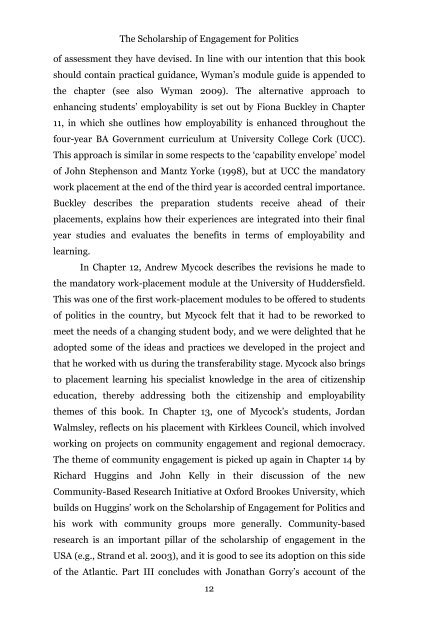The Scholarship of Engagement for Politics: - Higher Education ...
The Scholarship of Engagement for Politics: - Higher Education ...
The Scholarship of Engagement for Politics: - Higher Education ...
Create successful ePaper yourself
Turn your PDF publications into a flip-book with our unique Google optimized e-Paper software.
<strong>The</strong> <strong>Scholarship</strong> <strong>of</strong> <strong>Engagement</strong> <strong>for</strong> <strong>Politics</strong><br />
<strong>of</strong> assessment they have devised. In line with our intention that this book<br />
should contain practical guidance, Wyman’s module guide is appended to<br />
the chapter (see also Wyman 2009). <strong>The</strong> alternative approach to<br />
enhancing students’ employability is set out by Fiona Buckley in Chapter<br />
11, in which she outlines how employability is enhanced throughout the<br />
four-year BA Government curriculum at University College Cork (UCC).<br />
This approach is similar in some respects to the ‘capability envelope’ model<br />
<strong>of</strong> John Stephenson and Mantz Yorke (1998), but at UCC the mandatory<br />
work placement at the end <strong>of</strong> the third year is accorded central importance.<br />
Buckley describes the preparation students receive ahead <strong>of</strong> their<br />
placements, explains how their experiences are integrated into their final<br />
year studies and evaluates the benefits in terms <strong>of</strong> employability and<br />
learning.<br />
In Chapter 12, Andrew Mycock describes the revisions he made to<br />
the mandatory work-placement module at the University <strong>of</strong> Huddersfield.<br />
This was one <strong>of</strong> the first work-placement modules to be <strong>of</strong>fered to students<br />
<strong>of</strong> politics in the country, but Mycock felt that it had to be reworked to<br />
meet the needs <strong>of</strong> a changing student body, and we were delighted that he<br />
adopted some <strong>of</strong> the ideas and practices we developed in the project and<br />
that he worked with us during the transferability stage. Mycock also brings<br />
to placement learning his specialist knowledge in the area <strong>of</strong> citizenship<br />
education, thereby addressing both the citizenship and employability<br />
themes <strong>of</strong> this book. In Chapter 13, one <strong>of</strong> Mycock’s students, Jordan<br />
Walmsley, reflects on his placement with Kirklees Council, which involved<br />
working on projects on community engagement and regional democracy.<br />
<strong>The</strong> theme <strong>of</strong> community engagement is picked up again in Chapter 14 by<br />
Richard Huggins and John Kelly in their discussion <strong>of</strong> the new<br />
Community-Based Research Initiative at Ox<strong>for</strong>d Brookes University, which<br />
builds on Huggins’ work on the <strong>Scholarship</strong> <strong>of</strong> <strong>Engagement</strong> <strong>for</strong> <strong>Politics</strong> and<br />
his work with community groups more generally. Community-based<br />
research is an important pillar <strong>of</strong> the scholarship <strong>of</strong> engagement in the<br />
USA (e.g., Strand et al. 2003), and it is good to see its adoption on this side<br />
<strong>of</strong> the Atlantic. Part III concludes with Jonathan Gorry’s account <strong>of</strong> the<br />
12
















